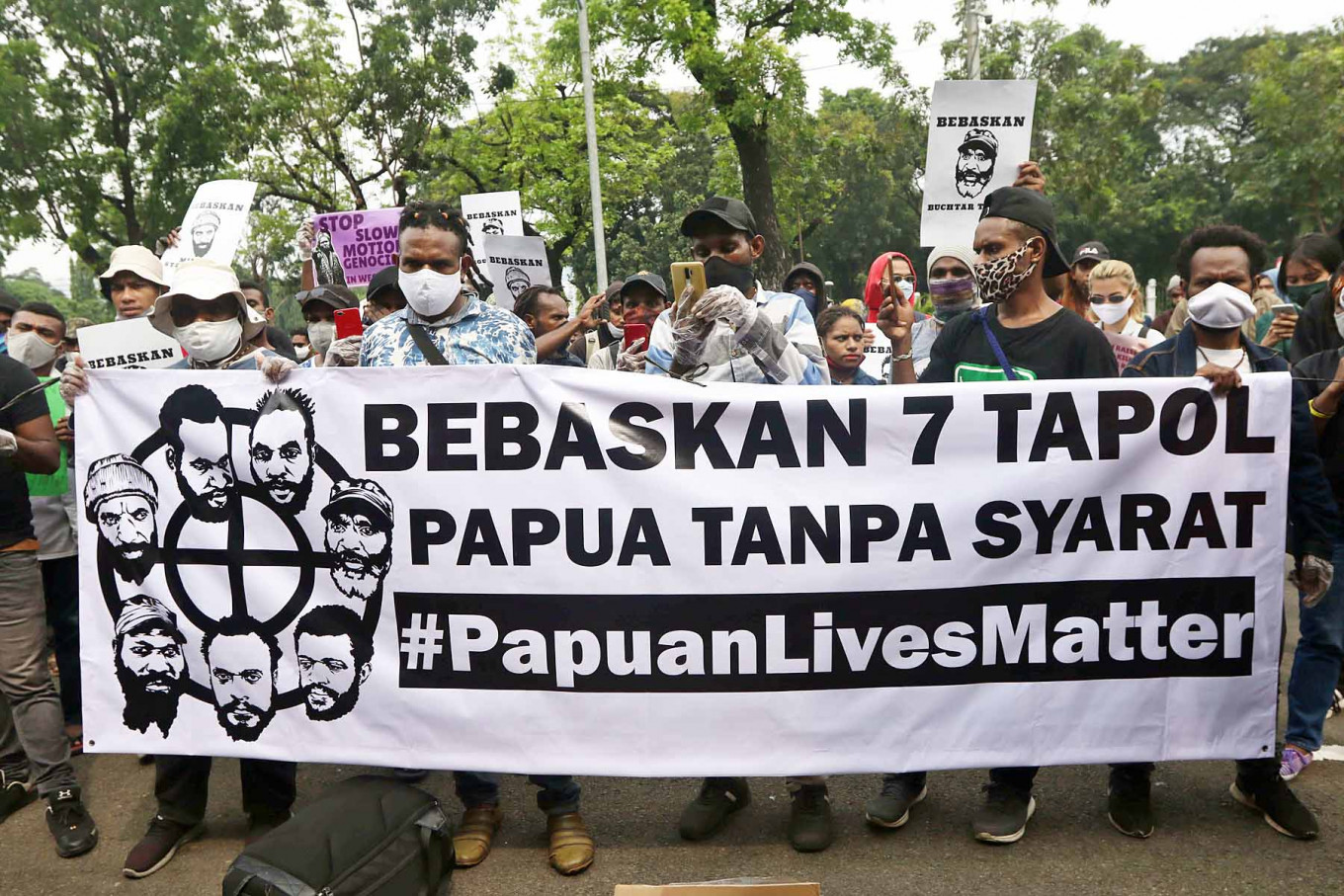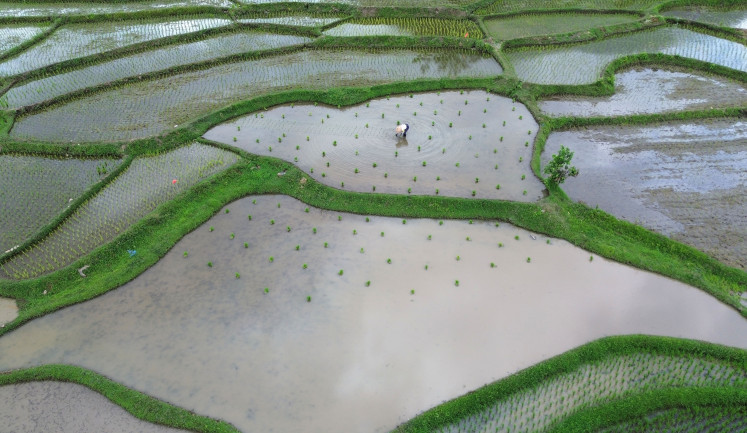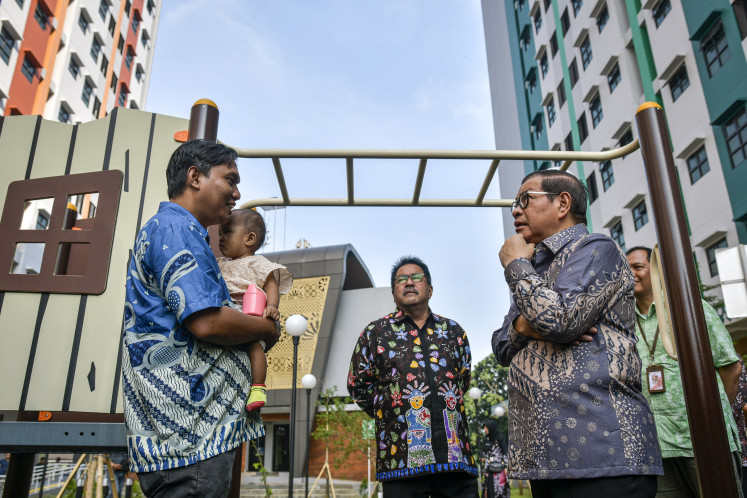Popular Reads
Top Results
Can't find what you're looking for?
View all search resultsPopular Reads
Top Results
Can't find what you're looking for?
View all search resultsIdentity politics during COVID-19: Ways forward
We have become preoccupied with delineating who we are along the lines of race, gender, religion, ethnicity, sexuality and many other issues to a point where we find it difficult to find a shared, common goal.
Change text size
Gift Premium Articles
to Anyone
 Students and activists of the Committee for the Release of Papuan Political Prisoners hold a rally on Monday, June 15, at the Supreme Court in Central Jakarta. As part of Indonesia’s spin-off movement #PapuanLivesMatter, which was spurred by the ongoing Black Lives Matter movement around the world, the protesters demanded the release of the seven Papuan activists standing trial on treason charges at the Balikpapan District Court in East Kalimantan. JP/Dhoni Setiawan (JP/Dhoni Setiawan)
Students and activists of the Committee for the Release of Papuan Political Prisoners hold a rally on Monday, June 15, at the Supreme Court in Central Jakarta. As part of Indonesia’s spin-off movement #PapuanLivesMatter, which was spurred by the ongoing Black Lives Matter movement around the world, the protesters demanded the release of the seven Papuan activists standing trial on treason charges at the Balikpapan District Court in East Kalimantan. JP/Dhoni Setiawan (JP/Dhoni Setiawan)
M
ost countries were hardly prepared to face the speed and invincibility with which COVID-19 spread. The Chinese city of Wuhan was the first to see the outbreak emerge in late 2019; by Jan. 25, 2020, more than 10 countries had been affected with more than 1,000 cases (Foreign Affairs, 2020).
The World Health Organization (WHO) declared COVID-19 as a pandemic on March 11, by which time it had already spread to hundreds of countries (WHO, 2020).
As their healthcare systems became overwhelmed, governments around the world scrambled to put in place measures such as lockdowns and physical distancing to control the further spread of COVID-19 and flatten the epidemic curve. As the world slowed down, the economies of both developed and developing countries were put under unprecedented strain.
COVID-19 is a stark reminder of how globalization has made humanity highly interconnected and interdependent, and of the precariousness of our existence in light of our increasing exploitation of and dependency on finite natural resources.
For decades, scientists have warned governments that the way the extractive industries drive the global economy will not sustain the planet for long (Rouhad, 2020). Now is the moment for nations, as they start to recover from the economic downfall of the pandemic, to rethink their economic foundations to ensure that the planet’s limited resources can sustain humanity as long as possible.
But the social conditions shaped by the very economic structure that has cost lives during the COVID-19 pandemic are also affecting the way we connect with fellow human beings.
Global headlines in the first week of June covered the death of African-American George Floyd at the hands – or rather, under the knee – of a white police officer. The video of his killing while in police custody went viral on social media (Bhutto, 2020). Those who were privileged enough to work from home were central to the social process of raising global awareness on the racial oppression in the United States.
However, the racial identity politics of the #BlackOutTuesday and #BlackLivesMatter movements, and in that sense, the Indonesian spinoff movement #PapuanLivesMatter, are reminiscent of the unfortunate fragmentation that occurred among progressive academics and civil society in democratic movements. We have become preoccupied with delineating who we are along the lines of race, gender, religion, ethnicity, sexuality and many other issues to a point where we find it difficult to find a shared, common goal.
More importantly, in our appeal for recognition of marginalized groups, right-wing political groups in both developed and developing democracies have been much more effective in exploiting identity politics. We see Trumpence in the US and Brexit in the United Kingdom among established Western democracies (Morelock, 2018); in developing Asian democracies we see Hindutva nationalism in India’s leader Modi (Morelock, 2018) and the 212 movement in Indonesia (Hadiz & Rakhmani, 2017).
Why has the right been so successful at this?
Some scholars have explained that the rise of right-wing identity politics was preceded by rapid transformations as demonstrated by the number of electoral democracies, the decline in extreme poverty and unprecedented economic growth.
However, these rapid transformations came with a sharp increase in inequalities in both developed and developing worlds. Moreover, this increase was generally felt by the already privileged, which David Harvey (2007) calls an “upward redistribution of wealth” among the secure middle class.
The middle class has access to private health care, housing, banking, insurance and other social services that will catch them in times of economic shock. State withdrawal in the provision of social services, and the increasing role of the private sector in supplying these services with the aid of market mechanisms, is one of the many consequences of neo-liberal transformations since the 1980s (Harvey, 2005).
So what do we – those of us who identify with progressive thinking and are usually of the middle class – to do?
I recall here Nancy Fraser’s appeal in 2000 for the politics of redistribution. Pressing times such as these, when we are socially disconnected and divided by class and culturally specific identity politics, while being ever reminded of our universal mortality by the global pandemic, is a historical juncture where we must find the lowest common denominator in our identity-based differences.
We all deserve a social safety net that will catch us when we fall, and those who are able to provide this must do so as an act of self-governance, or “the conduct of oneself” (Foucault, 1990). Reformist bureaucrats, whether in state universities or ministries and also part of the secure middle class, are able to apply self-governance and provide safety nets through organizational instruments and resources.
The politics of redistribution can be realized in everyday politics and larger social movements toward the inclusion of the socially, economically and culturally marginalized, all the while maintaining diversity so our society develops resilience on a foundation of cultural collaboration.
As history has discovered, the competition that is social Darwinian, whether based on identity or externalized in the precarious labor market, is destroying our social and natural environments. It is within this framework that I believe we should reimagine our post-COVID societies in the world, and in Indonesia.
***
The writer is Communications lecturer at the Faculty of Social and Political Sciences, University of Indonesia (UI). This article is a reproduction of an original presentation at the ICONIC 2020 Public Intellectual Forum, held on June 12 by the Education and Culture Ministry’s Culture Directorate General and the UI Faculty of Humanities.









